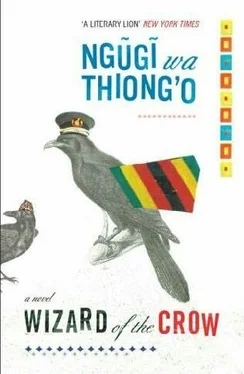“What, are they leaving?” asked the Ruler.
“Yes,” Machokali said.
“When?”
“Tomorrow!”
“Without seeing me?”
“My Lord of Excellency, I tried everything possible to delay their departure so they could have the honor of being received by you. They did delay out of respect, but in the end said they simply had to return to New York.”
“What of their report?”
“They are going to work on it in New York and come up with appropriate recommendations.”
“How do things look?”
“Not bad. Not bad at all. In fact, they have invited you or me to visit New York should we need to bolster our case before they make a final decision. I told them to put it in writing, in black and white, as the English say.”
Slowly he pulled out an envelope from his pocket and handed it to the Ruler, who, try as he did to restrain himself, could not contain his curiosity and ripped open the envelope immediately. He perused the letter and a smile lit up his face.
“The invitation is a bit general, though,” remarked the Ruler. “It says if I happen to be in New York… what do they mean, Markus?”
With the Ruler’s comment about the invitation being open and vague, Sikiokuu saw a chance to talk himself into favor and deflect the focus from the issue of Nyawlra and Vinjinia.
“Congratulations to you, Our Savior,” he chimed in confidently. “The invitation is timely indeed; and the new American president might even be behind its issuance. The Global Bankers are cunning. They may have made the invitation open only to see if Aburlria is serious about securing the loan. To send one minister might make the bank think that the project is not very high on our list of priorities, but if Your Mighty Excellency went there in person, accompanied by some of us who know how to listen”-and here he touched his ear-lobes for emphasis-”it would make the directors know that we mean business and that we are all united behind Marching to Heaven.”
“Yes,” another minister commented. “Let’s leave the messengers aside and go straight to the man at the top for a face-to-face.”
“Time for a state visit,” another minister offered.
“And it would be good for His Royal Excellency to appear on TV, especially on GNN’s Meet the Global Mighty,” Big Ben Mambo suggested. “All the greats of the twentieth- and even twenty-first-century Western civilization have appeared on it.”
The discussion had become a free-for-all.
“I have heard it said that there has not been a single leader from Africa on that program, is that true?” another one asked.
“Except Nelson Mandela,” another one said.
“You see how these people discriminate against Africa?” another said with a touch of anger. “From the West they choose statesmen but from Africa, jailbirds. Unbridled racism.”
“That means,” observed yet another, “that if and when the Ruler agrees to appear on the program, he will be the first real leader from Africa to join the Global Mighty.”
The chance to go to New York to be wined and dined while lobbying for support for Marching to Heaven was medicine to the Ruler’s wounded soul.
“It is time for all of you to listen,” he barked, instantly creating a hush. “It is said that there is no smoke without fire. Dark clouds precede a storm. I was not very happy to hear that Tajirika, my chairman for Marching to Heaven, employs people without first checking their background and history thoroughly. Do you hear me, Machokali? At the same time I was not pleased to hear of the arrest of his wife, what is her name, Vinjinia, and I don’t want the story to spread beyond these walls to the press. I want Vinjinia released immediately. I don’t want even a whisper of this botched affair to reach the Bank people. But I want Tajirika investigated, though subtly. Do you hear me, Sikiokuu?”
“Yes, sir. And will Tajirika continue as chairman of Marching to Heaven?” Sikiokuu asked, emboldened by the Buler’s judgment. “I suggest that he be relieved of his post immediately so that he cannot interfere with the investigation.”
“Shut your mouth,” the Buler warned Sikiokuu, “or I will do so for you. We do not change horses in midstream. Tajirika remains in his post.”
It was Machokali’s turn to feel victorious; he even managed a smile that vanished as quickly as it had come.
“I will appoint a deputy chairman; I charge Minister Sikiokuu to give me recommendations. And Sikiokuu, I want you to set up a commission to investigate this matter of queues and the ensuing mania. The commission of inquiry must find out where, when, and how the queues began and how the enemy came to exploit it as cover for her shameful acts. While the other ministers are welcome to suggest members of the commission, I leave its composition, including the election of chairperson, to Sikiokuu.”
Sikiokuu was elated by the developments. He had triumphed over his archrival, or so he thought. His euphoria was dashed when the Buler announced: “I want full reports on my desk when I return from New York!
“And as for you, Machokali,” the Buler said, turning toward him. “Busy yourself with arranging my forthcoming trip to New York. Fit in as many state visits as you can. I don’t want these Global Bank people to think that I am making the trip for the sole purpose of negotiating with them.”
As disappointed as Sikiokuu was about not going to New York, Machokali on his part was displeased to leave his archenemy conducting a possibly damaging investigation. He tried to figure out ways to tie Sikiokuu’s hands.
“What is to be done about Nyawlra?” he asked. “If the back of the Movement for the Voice of the People is not broken, the Global Bank might feel reluctant to release money to a country threatened by insurgency.”
These words pierced the soothing dreams of state visits, reviving memories of the scandal of Eldares. The anger at the women and the lust for vengeance came back with a force that almost choked the Ruler. Why did they do that to me in front of all the eyes of the world?
How does one separate fact from fiction in telling the story of what the women did on that day? All who told it, and there were many versions, insisted they had witnessed it with their own eyes. Not in dispute was this: there had never been so large a public gathering than at the site of the dedication for Marching to Heaven.
What accounted for the crowd? Party stalwarts? The radio station that kept on urging people to go to the site? The answer may very well lie in the statement that Big Ben Mambo, in his capacity as the Minister of Information, disclosed that the Global Bank missionaries would be the major guests of honor. This revived and intensified the rumors that the delegates had come to dole money out to the people, a radical departure from their normal practice of giving it all to the State.
NGOs sprang up to advise the grass roots on how to use the money. Yet others on the rights of the grass roots vis-ä-vis free gifts from banks. Some feminist groups, noting that the members of the Global Mission and the ministers who took them from queue to queue were all men, saw male intrigue and formed a Just for Women movement for a share of the Global Bank. Rival NGOs initiated their own queues with their own slogans.
When the day of promise came, all the queues that had mushroomed in Eldares for different needs now zigzagged their way to the park. People, some of whom came from far away, began camping out at the site days before the event.
“We, too, were there,” Nyawlra told Kamltl. “Some of our people, mostly women, mixed with others at the site days earlier. In the glow of overwhelming attendance, we planned to champion democracy and denounce dictatorship in broad daylight, and the promised presence of the Global Bank made things easier for us. How ironic! Democratic space guaranteed by the bank we opposed!”
Читать дальше












